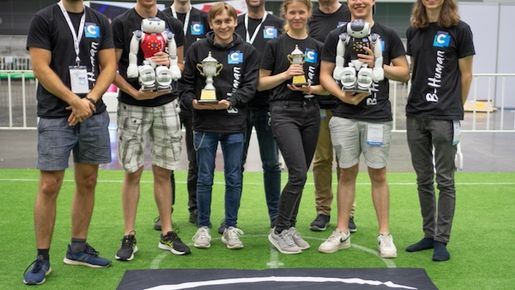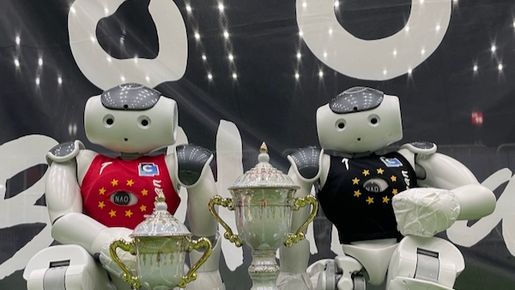B-Human took the victory in Bangkok, Thailand, with a clear lead over runner-up HTWK Robots as well as rUNSWift from Sydney (3rd place) and the Nao Devils from Dortmund (4th place). But the pandemic also left its mark on the competition. On the one hand, there were fewer teams present and some participation from afar. On the other hand, there were a larger number of additional technical competitions, most of which could have been conducted remotely had the face-to-face event been canceled. These so-called Technical Challenges were about exploring possible rule changes for the future. For example, the game was tested with teams of seven NAO robots each – humanoid robots that have been playing in the RoboCup since 2007. So far, five robots form a team. They also tried out whether the robots could recognize referee gestures so that they might in future interact directly with the referee instead of being told the referee’s decisions via radio transmission. A total of four Technical Challenges were evaluated together and here the team B-Human also took first place.
During the pandemic, the league’s most important innovation was that its own software could be run on foreign robots without the human team members even being on-site. This year, the main competition essentially focused on reducing the communication between robots during the game. Previously, each NAO was allowed to send a maximum of one message per second. According to the new rules, a maximum number applies to the whole team and the whole game, which effectively corresponds to a reduction in data exchange by a factor of five. So each robot always had to consider beforehand whether sending a message really made sense in the current situation. The Bremen team used numerous criteria for this as well as a sliding limit based on the remaining playing time to allow for continued cooperative play as a team. This form of team play, in particular, also contributed to the strength of B-Human in the current tournament. The flexible positioning and dynamic task division of the field players – together with the ability to play precise passes better to positioned teammates, which has been used since this year – led to clear superiority on the field in all RoboCup competitions, so that B-Human became world champion in the Standard Platform League for the ninth time.
Currently, B-Human comprises 15 students from the University of Bremen, one former student who is committed to the team in his spare time, and the supervising scientists Dr. Thomas Röfer and Arne Hasselbring from DFKI’s Cyber-Physical Systems research division, which is headed by Professor Rolf Drechsler, and Dr. Tim Laue from the University of Bremen from Professor Udo Frese’s research group. CONTACT Software, the leading provider of solutions in the area of product processes and digital transformation, has been the main sponsor of B-Human since 2017.
Further Information:
RoboCup 2022
B-Human
B-Human on Twitter
B-Human on Facebook
B-Human on Instagram

![[Translate to English:] [Translate to English:]](/fileadmin/user_upload/DFKI/Medien/News/2022/Events_und_Keynotes/2022_RoboCup_WM_JT_Genter_1_dfki_web.jpg)

